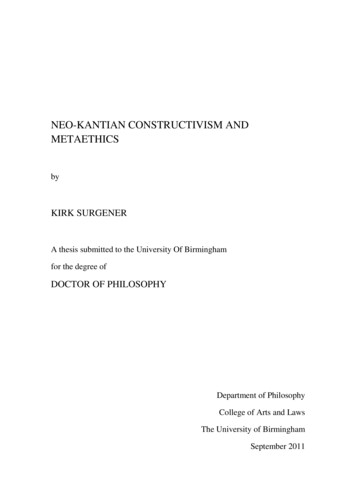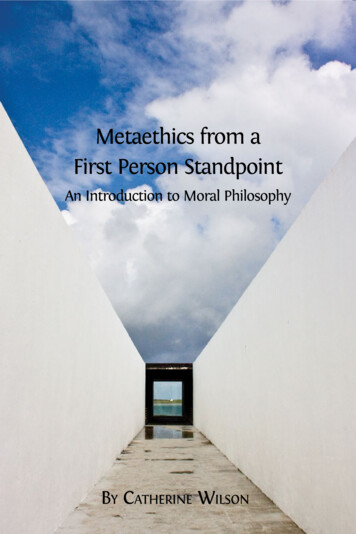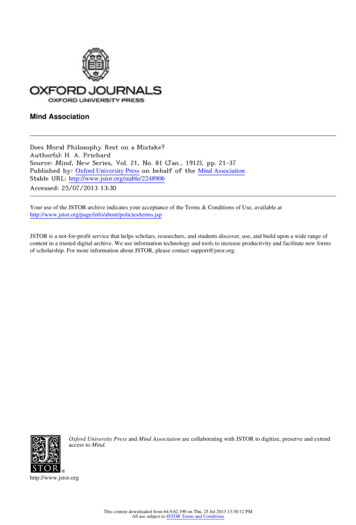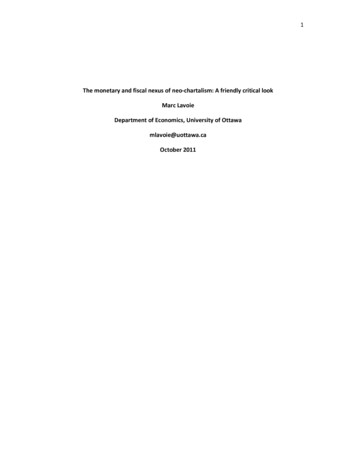
Transcription
NEO-KANTIAN CONSTRUCTIVISM ANDMETAETHICSbyKIRK SURGENERA thesis submitted to the University Of Birminghamfor the degree ofDOCTOR OF PHILOSOPHYDepartment of PhilosophyCollege of Arts and LawsThe University of BirminghamSeptember 2011
University of Birmingham Research Archivee-theses repositoryThis unpublished thesis/dissertation is copyright of the author and/or thirdparties. The intellectual property rights of the author or third parties in respectof this work are as defined by The Copyright Designs and Patents Act 1988 oras modified by any successor legislation.Any use made of information contained in this thesis/dissertation must be inaccordance with that legislation and must be properly acknowledged. Furtherdistribution or reproduction in any format is prohibited without the permissionof the copyright holder.
I’d like to thank Alex Miller for giving me all the arguments in this; JoeMorrison and Darragh Byrne for printing it; Iain Law and Hallvard Lillehammerfor examining it; and Naomi Maria Callas Thompson and Natalie Ashton forproof-reading it. I’d also like to thank all the people who have argued with meabout the contents over the years, including but not limited to: Jussi Suikkanen,Ben Matheson, Ben (II) Bessey, Roxanne Harmony Green, Paul ‘The Broadbean’Broadbent, Khai Wager, Callum Hood, Anna Brown, Damian ‘John’ Lewis,Helen Louise Crane, David Papineau, Philip Goff, ‘Nikk’ Effingham, HelenBeebee, Joss Walker, Max Kölbel, Sarah-Louise Johnson, Gis Infield-Solar,Mihaela Popa, Sarah Gancarczyk, John Gingell, Kate Major, Pegah Lashgarlou,Sorana ‘Piggy’ Vieru, Melanie Parker and Emma Cecilia Bullock.
TABLE OF CONTENTSINTRODUCTION1CHAPTER ONE: THE NORMATIVE QUESTION AND MORAL REALISM5 613181.1 The Normative Question1.2 Substantive vs. Procedural Realism1.3 Korsgaard Against Moral Realism1.4 Korsgaard’s Rejection of Realism and the Distinction between NormativeEthics and Metaethics23CHAPTER TWO: INTERNALISM37 383942464952 2.1 The Normative Question: Moore, Mackie and Internalism- 2.11 The Normative Question and Moore’s Open-Question Argument- 2.12 The Normative Question and Mackie’s Argument from Queerness- 2.13 Judgement Internalism- 2.14 Internalism and the Open-Question Argument- 2.15 Internalism and the Argument from Queerness- 2.16 The Normative Question, Internalism, the Argument from Queernessand the Open-Question Argument2.2 Internalism vs. Externalism- 2.21 The Amoralist and the Inverted-Commas Response- 2.22 Smith’s Response to the Amoralist Challenge- 2.23 The Strength of the Amoralist Challenge- 2.24 The Argument from Fetishism- 2.25 van Roojen on Rational Amoralism- 2.26 Rationalism, Internalism, Relativised Rightness and Frege’s Puzzle- 2.27 Internalism and Rational Amoralism546062636771858796CHAPTER THREE: THE GENERALISED ANTI-VOLUNTARISM ARGUMENTAND MORAL REALISMS115 3.1 Voluntarism3.2 Voluntarism Reconsidered3.3 Externalist Moral Realism- 3.31 Analytic Naturalism- 3.32 Cornell Realism119121130131147
-3.33Moral Properties and Ontological Commitment3.34 Program Explanation3.35 Cornell Realism’s Semantic Programme147153164CHAPTER FOUR: THE NEO-KANTIAN AND EXPRESSIVISM184 185189198202204206207213214219222226235239242252 4.1 Expressivism4.2 The Neo-Kantian Rejection of Expressivism4.3 The Frege-Geach Problem- 4.31 Higher-Order Attitudes- 4.32 Inconsistency in Content- 4.33 Hierarchy of Attitudes- 4.34 Adding Structure to the Attitude4.4 Hybrid-Expressivism- 4.41 Ecumenical Cognitivism v Ecumenical Expressivism- 4.42 Ecumenical Cognitivism and Judgement Internalism- 4.43 Ecumenical Expressivism and the Frege-Geach Problem- 4.44 Ecumenical Expressivism does not Solve the Frege-Geach Problem- 4.45 Ecumenical Cognitivism does not Capture Judgement Internalism- 4.46 Diagnosis4.5 Realist-Expressivism and Neo-Expressivism4.6 Hybrid-Expressivism and Neo-KantianismCHAPTER FIVE: NEO-KANTIAN CONSTRUCTIVISM255 2562722822862935.1 Neo-Kantian Constructivism and Judgement-Dependence5.2 The Derivation of the Categorical Imperative5.3 Constitutivism5.4 The Inescapability of Agency5.5 The Standard Objection to KantCONCLUSION301BIBLIOGRAPHY304
INTRODUCTIONWhy should I be moral? This question gets to the heart of the normative problem, that is,the problem of grounding the normative force of moral obligations. People who take thenormative problem seriously think that even once we have determined which actions areright or which objects are good there is still a question to be raised – why should weperform right actions? Why should we pursue good objects? In some cases what moralityasks of us can be hard and the normative problem there seems particularly pressing.Christine Korsgaard has used the normative problem to launch arguments against two of themost popular metaethical accounts – moral realism and expressivism. She argues thatreflection on the normative problem forces us to reject moral realism and expressivism, andadopt a position which „transcends‟ or „goes beyond‟ metaethics as it is traditionallyconceived. We can call this positive view neo-Kantian constructivism.This thesis is a sustained examination of both of these parts of Korsgaard‟s work – thenegative attacks on moral realism and expressivism; and her own neo-Kantianconstructivism. I have two ambitions for it. First, I want to get clear formulations of andevaluate Korsgaard‟s arguments against her metaethical competitors and for her ownposition. Second, by engaging in the first task I hope to offer some results that will beindependently interesting to people who are interested in metaethics.1
Views similar to the ones Korsgaard defends have been advocated by other philosophers. Inthis thesis I have concentrated almost exclusively on Korsgaard‟s own view. This is in partbecause extracting a clear formulation of Korsgaard‟s arguments from her work is notalways easy, and requires some amount of space. Also, I am more interested in how a viewlike neo-Kantian constructivism contrasts with completely different views in metaethicsthan in the details of different types of neo-Kantian constructivism (This is, of course, tosome extent a false dichotomy. One way to explore how neo-Kantian constructivism hooksup with the rest of metaethics is to explore differences within the constructivist camp. I canonly say this: it is only to some extent a false dichotomy – I have felt that the best way topursue the issues I‟m interested in is to concentrate on a single view. I hope that the thingsthat I say about metaethics are sufficiently independently interesting to compensate for thissomewhat narrow focus).My conclusion will be that Korsgaard‟s position, although worth engaging with, ultimatelyfails. Her arguments against moral realism can be resisted if we formulate the right type ofmoral realism. However, her complaints about expressivism, when charitably interpreted,do cause problems for the expressivist. I give a new way of interpreting her ownmetaethical position, but argue that it ultimately fails in its ambitions.I begin in chapter one with an examination of attempts to dismiss the normative problemand the questions stemming from it as confused and thus safely ignored. I argue there thatsuch attempts rely upon an overly austere conception of the tasks of metaethics, and aquestionable thesis about the relationship of metaethics to normative ethics. I also begin tooutline Korsgaard‟s argument against realism.2
In chapter 2 I argue that we can get a clearer grip on Korsgaard‟s argument against realismif we construe it as a problem to do with the alleged motivational import of moraljudgements. Variations of the claim that moral judgements are inherently motivating areoften made (a claim we can call „internalism‟), and this claim causes problems for realism(against suitable background assumptions). Seeing Korsgaard‟s argument this way allowsus to explain the affinities she claims her argument has with G.E. Moore‟s open questionargument and J.L. Mackie‟s argument from queerness. I argue that the lesson we shoulddraw is that internalism is a troubling claim for moral realism, and that we shouldinvestigate whether there are compelling reasons to accept it. I first argue that MichaelSmith‟s two-pronged manoeuvre in favour of internalism fails, before going on to considerMark van Roojen‟s more recent case for internalism – again arguing that it fails. Whatmoral realists need to do, I claim, is establish a viable form of externalist realism, and hencethey will be able to dodge Korsgaard‟s argument when it is construed in this manner.I then go on (chapter 3) to offer a second interpretation of Korsgaard‟s argument where sheends up offering what we can call, following Mark Schroeder, a generalised anti-voluntaristargument. The upshot of this argument is that moral realism, to avoid the argument, shouldbe reductionist. I then go on to consider two versions of moral realism: one externalist andnon-reductionist (Cornell realism); and the other externalist and reductionist (StephenFinlay‟s analytic reductivism). If either of these views is viable then moral realism is able tododge one or both of the construals of Korsgaard‟s argument. I argue that Finlay‟s positiondoes well along a number of dimensions, but that it invokes a methodology that is notlicensed by the account of analyticity he adverts to. Cornell realism can resist two of themajor lines of attack typically launched against its semantic programme and its ontologicalclaims. Both views, I think, offer us ways to circumvent Korsgaard‟s arguments.3
Chapter 4 looks at Korsgaard‟s engagement with expressivism. I flesh out her complaintsagainst expressivism in a way that has them as getting at something like the Frege-Geachproblem – the problem of explaining how the semantic properties of complex expressionsare built up out of the semantic features of their simpler constituents. I survey the mostpopular attempts to deal with this problem and argue that they are all unpromising. Thismotivates a study of a new type of position – hybrid expressivism – which combineselements of cognitivist and non-cognitivist semantics in order to deal with the problems thatattend each type of semantic theory individually. I argue that hybrid expressivism eitherfails, or is best construed as a more sophisticated version of moral realism.Finally, I turn to Korsgaard‟s positive proposal, neo-Kantian constructivism. I propose anovel way of interpreting this position, where we construe constructivism as a form ofcognitivist anti-realism along lines inspired by Crispin Wright‟s work on judgementdependent qualities. Doing things this way allows us to both give Korsgaard most of whatshe wants from a metaethical theory as well as generating a clear proposal to evaluate.When things are put this way the viability of constructivism depends upon being able togive the right sort of argument for the categorical imperative. When we try to do this, wesee that neo-Kantian constructivism ultimately fails.4
CHAPTER ONE: THE NORMATIVE QUESTION AND MORALREALISMWhen investigating morality, it seems as if we are not just looking for a list of things thatwe should or should not do. In addition, we expect to find out why we are beholden to thedictates of morality – to find out how morality gets its normative force. This question – whyshould I be moral? – Christine Korsgaard calls „the normative question‟ and it provides thebasis for her moral thinking. She uses this question to attempt three manoeuvres: first, toshow that traditional metaethical theories like moral realism and expressivism areinadequate – they lack the resources to answer the normative question satisfactorily; second,that this failure is in part a result of the inadequacies of the typical distinctions (e.g. betweencognitivism and non-cognitivism) made in contemporary metaethics; and third, that neoKantian constructivism (a position which „goes beyond‟ traditional metaethics) does havethe resources to provide a satisfactory answer to the normative question, and so we shouldaccept it.The normative question, then, is at the heart of Korsgaard‟s moral philosophy. Here I willtry to get clear on precisely what the normative question is asking for (§1.1), before layingsome additional groundwork (§1.2) that will be required for showing how Korsgaard tries touse the normative question to undermine moral realism (§1.3).5
1.1The Normative QuestionKorsgaard contends that there are two major tasks involved in systematic moral theorising.First we want to come to understand three features of moral concepts: 1. The meaning ofmoral concepts, or to use Korsgaard‟s metaphor “what they contain” (1996, 10) – what doesit mean to say that something is good or bad, or to call a person vicious or virtuous etc. 2.We want to know to which objects these concepts are appropriately applied – just whichthings are good or bad, which people are virtuous or vicious. 3. Where do these moralconcepts come from? That is, how did we come to possess them?In addition to these tasks (providing what Korsgaard calls a „theory of moral concepts‟) thenature of moral concepts also means that there is another account we need to provide. Wedon‟t just use moral concepts to describe the world, but also to make demands upon oneanother:[E]thical standards are normative. They do not merely describe a way in which wein fact regulate our conduct. They make claims on us; they command, oblige,recommend, or guide. When I say that an action is right I am saying that you oughtto do it; when I say that something is good I am recommending it as worthy of yourchoice. it is the force of these normative claims – the right of these concepts togive laws to us – that we want to understand. (Korsgaard, 1996, 9)Morality does not just make these claims upon us, these claims sometimes have a practicaleffect – it seems as if we sometimes alter our behaviour on the basis of what morality6
demands, sometimes to a radical degree: fiction and everyday life offer us examples ofpeople who purportedly sacrifice their own lives for the sake of doing the right thing.Furthermore, either failing or succeeding to meet these demands can have psychologicaleffects upon us – failing to fulfil what we take to be our duty can cause distress, forexample.Korsgaard takes these observations to demonstrate the need for two criteria of adequacy foran account of the nature of morality. First, it must be explanatorily adequate – it must beable to explain the seeming importance of morality in our lives, and the practical andpsychological effects it can have on us. Second, it must be justificatorily adequate – it mustbe able to explain whether we are justified in giving morality such importance; whether weshould make the judgements that we do; whether we should allow those judgements to havethe practical and psychological effects that they do; and why morality has the practicalsignificance that it seems to possess. Asking whether a theory of morality fulfils this secondcriterion is what asking the normative question involves.We can see how these two criteria diverge in a case where the explanation of our moralpractices works to debunk those practices in some way – an explanation where once we seehow our moral practices are explained, we no longer feel they have any justification. Forexample we might discover that morality has some kind of genetic basis, what Korsgaardcalls „the evolutionary theory‟. According to this theory: “right actions are those whichpromote the preservation of the species, and wrong actions are those which are detrimentalto this goal.” (14). Further, suppose that:7
The evolutionary theorist can prove, with empirical evidence, that because this is so,human beings have evolved deep and powerful instincts in favour of doing what isright and avoiding wrong. (14.)If this theory were true, then it could give an account of our moral practices which wasexplanatorily adequate – no wonder we place such huge importance on morality, we have“deep and powerful instincts” that incline us to act morally. However, would such a theorybe good enough to justify those moral practices?Suppose morality demands that you yourself make a serious sacrifice like giving upyour life, or hurting someone that you love. Is it really enough for you to think thatthis action promotes the preservation of the species? You might find yourselfthinking thoughts like these: why after all should the preservation of the speciescount so much more than the happiness of the individuals in it? Why should itmatter so much more than my happiness and the happiness of those I care mostabout? Maybe it‟s not worth it. (14-15).So, once we see that our moral practices are explained by a theory like this, we start todoubt whether they really are justified. Such a theory exhibits, as Korsgaard puts it,„normative failure‟. It is the existence of the second criterion (justificatory adequacy) thatallows the possibility of moral scepticism. It should be obvious, even to a sceptic, thatpeople apply moral concepts quite regularly – a moral sceptic does not deny that peopleutter sentences like „Tony Blair was a morally base individual‟ or „There is nothing wrongwith telling a white lie.‟ Instead, the sceptic can simply deny that the effects thesejudgements have are justified – we have no good reason to take my judgement of TonyBlair‟s character to influence my behaviour. This is because we need an account of why Ishould pay attention to the demands of morality. If we can formulate an adequate answer to8
the normative question then we can have something to say in response to the moral scepticwho claims that we have no reason to pay attention to morality.Another way to get clear on what the normative question is asking us for is to distinguish itfrom other, closely related, questions with which it might be confused. Korsgaard does thisby looking at H.A. Prichard‟s argument that the question „why should I be moral?‟ isconfused. Briefly put, Prichard claims that there are two possible types of answers to thequestion: 1. We give an answer involving moral notions (e.g. „because it is your duty‟), inwhich case we have argued in a circle; 2. We could give an answer from outside of morality(e.g. „because doing so would make you happy‟) but now our answer looks irrelevant – wefeel as if the reason why we should be moral can‟t be because it would be good for us 1. So,the question „why should I be moral?‟ only admits of answers that are either irrelevant orcircular. Prichard takes this to indicate that although the normative question looks coherent,it is not (see Prichard 1912 and Korsgaard 1996, 32).Korsgaard argues that one way to see how this is confused, and show that the normativequestion is live, is to look at what Prichard advises us to do in the case where someone asks„why should I be moral?‟ According to Prichard, a question like this is a disguised way of1This answer is both extensionally inadequate – morality seems to diverge from self-interest, at least insome cases – and inadequate in another sense: if we say that we should be moral in order to further ourself-interest, we haven’t yet explained why morality is binding on us, for now we need an explanation ofwhy we should feel bound by our self-interest. The fact that people often do act in their self-interest,and that it seems obvious that one should, we can imagine Prichard saying, does not actually explainwhy self-interest is normatively binding.9
asking whether a particular criterion with moral significance applies to a particular object. 2So, suppose that someone argues that the correct moral theory is some form ofconsequentialism with the relevant consequences restricted to psychological states ofpleasure or pain. This theory demands that we maximise the amount of pleasure in theworld and minimise the amount of pain. According to this theory, good states of affairs arethose with the greatest balance of pleasure over pain3, and right actions are those thatpromote such state of affairs. Now, suppose somebody asks of some action that they agreeto be right whether they should perform it. Prichard claims that this person is really askingwhether the action promotes the greatest balance of pleasure over pain. In order to answertheir question we don‟t have to do anything mysterious; instead we simply remind them thatthe morally significant criterion applies – we say to them „But look, the action promotes thegreatest balance of pleasure over pain, it must be right!‟ This answer is appropriate, becauseanyone asking such a question is confused – they are not really asking whether they shouldbe moral, instead they are wondering whether the criterion they use to distinguish the moralreally applies in this case. Korsgaard‟s normative question then, is, for Prichard, ageneralised confusion – asking „why should I be moral?‟ is to ask whether a particularmoral concept ever applies to any object, it is not to ask for an explanation of the normativeforce of morality (see Korsgaard 1996, 38-9).However, Korsgaard argues that the confusion is all Prichard‟s. The answer Prichard offersto our putative sceptic “addresses someone who has fallen into doubt about whether an2It seems here as if what Prichard is doing is offering a charitable re-interpretation of our question – thequestion, as literally stated, is confused. However, there is a nearby question that is significant that wecan interpret people who ask the confused question as trying to get at.3Of course Prichard himself, being a non-naturalist, would not identify goodness with the distribution ofpain and pleasure. Instead, he would claim (if he accepted this particular moral theory) that goodnesswas just necessarily connected with the distribution of pain and pleasure.10
action is really required by morality, not someone who has fallen into doubt about whethermoral requirements are really normative” (38). Korsgaard‟s diagnosis of this misfire is thatPrichard takes words like „right‟ and „obligatory‟ to be essentially normative, by definition.They are, as Korsgaard labels them, normatively loaded. If we accept this view, then thetwo questions: „Is this action really obligatory‟ and „Is this obligation really normative?‟collapse into one another – in order for an action to obligatory it must have normative force.We would only ever need to answer the first question. However, this invites confusion forthe question „Is this action really obligatory?‟ admits of a reading under which it is simply aquestion about the correct application of some moral notion – about whether the action doespromote the greatest amount of pleasure over pain. Because of this potential reading, andthe collapse of the second question in to the first, we imagine that once we have answered itwe have completed our work. Once we know that an action promotes the greatest balance ofpleasure over pain, there is no more that needs to be said about it. Korsgaard contends thatthis is a mistake. There is another reading of „Is this action really obligatory‟ available – onewhere we are asking not if it promotes the greatest balance of pleasure over pain (whichwould make it right) but whether we should be bothered about performing right actions. So,Korsgaard argues:Prichard‟s way of approaching the matter therefore leads us to confuse the questionof correct application with the question of normativity. And this actually happenedto Prichard himself. For it led him to think that once we have settled the question ofcorrect application, there can be nothing more to say about the normative question.(39)To put it another way, Prichard‟s collapsing of the distinction between the question of thecorrect application of a moral criterion and the normative question depends upon theassumption that morality really does have normative force. But this is precisely the11
assumption that the normative question is asking for an explanation, or defence, of. It isillegitimate to use this assumption as a way of showing the normative question to beincoherent, as Korsgaard‟s reading of Prichard has him doing.Of course, it could turn out that something like Prichard‟s conclusion is right. That there issomething wrong with the normative question. However, I suspect this is the sort ofconclusion we could only reach after seeing where attempts to answer it get us. Is it reallytrue, for example, that the question only admits of answers that are either circular orirrelevant? It seems rather hasty to accept this on the basis of what we have seen fromPrichard so far. For example, Korsgaard thinks that she does have a good answer to thenormative question, and it would be better to examine it in detail rather than dismissing theclaim in advance. In addition, this Prichardian move may be unnecessary, depending uponour purposes. Korsgaard wants to use the normative question not just as a way of promotingneo-Kantian constructivism (her own view) but also to attack moral realism, noncognitivism and the metaethical distinctions upon which these views rest. If we examinethese criticisms and find that, in fact, moral realism (for example) does have the resourcesto provide a satisfactory answer to the normative question then we might lose interest inattempting to dismiss the question from afar. Even if we are troubled that there is some kindof incoherence concealed within the normative question, it would still be an interestingfinding if the conclusions that Korsgaard draws from the question do not follow. Then wecould remain agnostic about the status of the normative question whilst resistingKorsgaard‟s manoeuvres for other reasons.44There is another line according to which Korsgaard’s project is entirely misguided, found in the work ofNadeem Hussain and Nishi Shah (2005, 2006a, 2006b). However, they argue not against the legitimacyof the normative question, but against its use by Korsgaard against certain metaethical views. The12
We have seen then that the normative question seems to provide a criterion of adequacy onany systematic moral theorising. The example of the evolutionary theory of moralitydemonstrates that we need not only an explanation of how morality has the effect that itdoes (in broadly psychological terms) but also an account of normative force. Also, we haveseen that the normative question needs to be distinguished from other, closely relatedquestions, such as the correct application of moral concepts. Once we do this, we see thatthe most obvious kind of attack on the coherence of the normative question is potentiallymisguided. This gives us, I claim, good reason to examine the uses of the normativequestion before we reach any grand conclusion about its status.Below we begin this process by first setting up a distinction we need in hand (§1.2) in orderto see how Korsgaard launches an attack on moral realism (§1.3).1.2Substantive vs. Procedural RealismMoral realism, as I shall use the term in this thesis, is a view identified by three claims:(1) Moral judgements purport to be true or false.normative question is coherent, but not pitched at the right theoretical level for Korsgaard to derive herconclusions. I tackle this argument for the irrelevancy of Korsgaard below.13
(2) Sometimes these judgements are true (in other words, their truth-conditions aresometimes fulfilled and the judgements in question accurately represent moralfacts).(3) These facts hold independently of our best judgements concerning them.There are a number of different types of moral realism, and one could design a number oftaxonomies to divide them. A useful one is given by Alex Miller (2003), which I will befollowing here. First we can ask whether the facts that our moral judgements purport torepresent are natural facts. If not, then our view will be non-naturalist, a position inhabitedby G.E. Moore (1903) who claimed that moral properties are sui generis, simple andindefinable, but also includes the work of John McDowell (1998) who tries to shed nonnaturalism of its objectionable epistemological baggage. If instead we decide that moralfacts are natural facts, then we face another choice – between positions which claim thatmoral facts reduce to other natural facts, and positions that view moral facts as irreduciblenatural facts. In the first camp we have the revising definitions strategy of Peter Railton(1989); and the non-revisionist strategies of Frank Jackson and Philip Petit‟s analyticfunctionalism (1995), Stephen Finlay‟s analytic naturalism (forthcoming) and others. Themain proponents of the second view (that moral facts are irreducible to other natural facts)have been the so-called „Cornell realists‟ – philosophers like Nicholas Sturgeon (1985,1986) who argue that moral facts earn their keep by featuring in some of our bestexplanations of natural phenomena.14
In addition, moral realists are also usually cognitivists – moral judgements express belieflike mental states which when true conceptually guarantee that the judgement is true 5. It iseasy to see how cognitivism sits well with the three claims above – if moral judgementshave descriptive content, and this content concerns the holding of mind-independent moralfacts then it seems natural to hold that moral judgements are belief-like mental states ratherthan desire-like non-cognitive states (which don‟t seem like the kinds of things capable ofhaving descriptive content). The close link between realism and cognitivism will becomerelevant when we consider Korsgaard‟s attack on the distinction between cognitivism andnon-cognitivism.Korsgaard offers another way of distinguishing between moral realisms – betweenprocedural and substantive realism. Both views agree that there are answers to moralquestions, and that there are right and wrong ways of going about answering them – someprocedures are better for arriving at answers to moral questions. The substantive realist addsthe claim that there are correct
College of Arts and Laws The University of Birmingham September 2011. University of Birmingham Research Archive . e-theses repository . . Iain Law and Hallvard Lillehammer for examining it; and Naomi Maria Callas Thompson and Natalie Ashton for proof-reading it. I'd also like to thank all the people who have argued with me










